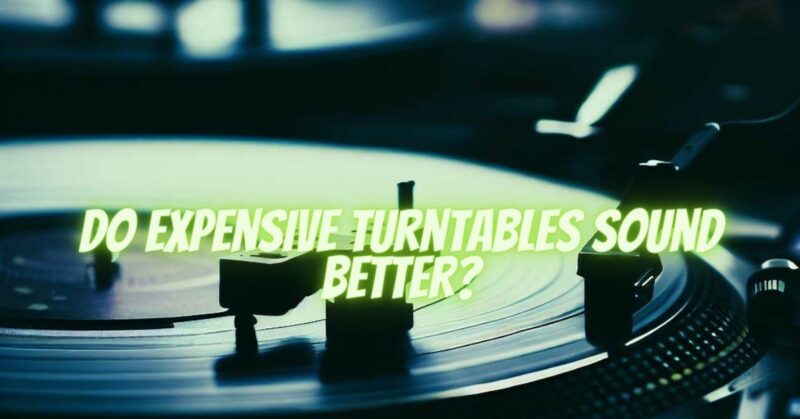The world of audio enthusiasts is one filled with passion, meticulous attention to detail, and a constant pursuit of sonic perfection. In this quest for audio nirvana, the turntable stands as a symbol of timeless craftsmanship and analog warmth. However, a pervasive question looms over the audiophile community: Do costly turntables truly deliver better sound? In this exploration, we will dissect the intricacies of turntable technology, delve into the factors that contribute to superior audio quality, and consider whether investing in a high-end turntable is a wise pursuit.
The Anatomy of Sound:
At the heart of the debate lies the fundamental understanding of how turntables produce sound. Vinyl records store audio information in the form of analog grooves. As the stylus traverses these grooves, it translates the variations in the groove’s depth into electrical signals. The resulting signals are then amplified and sent to the speakers. The inherent analog nature of this process is what distinguishes vinyl from digital mediums.
Components and Build Quality:
One argument in favor of costly turntables is the superior build quality and precision engineering that often accompanies a higher price tag. High-end turntables are crafted with materials that minimize vibrations and resonance, ensuring a more accurate reproduction of the recorded sound. The use of high-quality bearings, tonearms, and platters contributes to the reduction of unwanted mechanical noise, allowing the stylus to trace the grooves with unparalleled precision.
Speed Stability and Wow & Flutter:
Costlier turntables often boast superior speed stability, mitigating issues such as wow and flutter. Wow refers to slow speed variations, while flutter involves rapid speed changes. A high-quality motor, precision electronics, and advanced speed control mechanisms in premium turntables contribute to a more stable rotation speed, resulting in a cleaner and more faithful reproduction of the original recording.
Cartridges and Stylus Quality:
Another crucial factor influencing sound quality is the cartridge and stylus assembly. High-end turntables often come equipped with precision-engineered cartridges that translate the mechanical movement of the stylus into electrical signals with minimal distortion. The stylus itself plays a pivotal role, with costlier options utilizing advanced materials and shapes to trace the intricate details of the record’s grooves.
Room for Subjectivity:
Despite the technical advancements, the perception of sound quality remains a subjective experience. Factors such as personal preferences, listening environment, and individual hearing abilities contribute to the overall enjoyment of music. While costly turntables may provide a more accurate reproduction of the recorded sound, the value placed on these nuances is subjective and varies among listeners.
The Law of Diminishing Returns:
It’s essential to acknowledge the law of diminishing returns when evaluating the cost-effectiveness of high-end turntables. While an entry-level turntable can significantly improve audio quality compared to budget options, the law suggests that the incremental benefits of each additional dollar spent diminish over time. Audiophiles must carefully consider their budget constraints and the marginal gains achieved by investing in costlier turntables.
In the realm of audio, the pursuit of perfection is an ongoing journey. While costly turntables undeniably offer superior build quality, precision engineering, and advanced components, the decision to invest in one should be grounded in a balance between budget considerations and the subjective appreciation of nuanced sonic details. Ultimately, the quest for better sound is a personal one, and the true value of a high-end turntable lies in the ears of the beholder.


